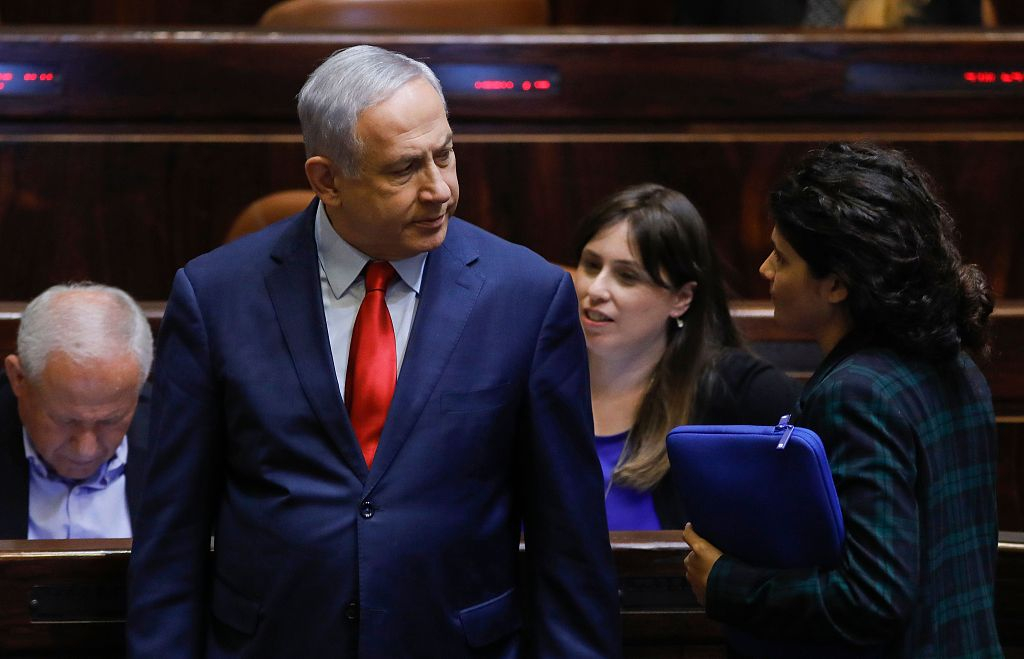
Opinion
15:50, 30-May-2019
Why did the Israeli parliament dissolve itself?
Wang Jin

Editor's Note: Dr. Wang Jin is a research fellow of Charhar Institute in China and a research fellow from Syria Research Center of Northwest University in China. The article reflects the author's opinion, and not necessarily the views of CGTN.
After winning parliamentary elections in April, Benjamin Netanyahu's Likud party should have been able to form a coalition with the other right-wing groups who won nearly 70 seats. However, Netanyahu has failed to do so, and new elections will be held in September.

Israeli Prime Minister Benjamin Netanyahu (R) walks to a party meeting in the Knesset (Israeli parliament) building in Jerusalem, May 29, 2019. /VCG Photo
Israeli Prime Minister Benjamin Netanyahu (R) walks to a party meeting in the Knesset (Israeli parliament) building in Jerusalem, May 29, 2019. /VCG Photo
Netanyahu's failure to form a coalition can be attributed into two variables: Netanyahu's corruption indictment and the issue of drafting ultra-Orthodox (Haredi group) students into the military.
Netanyahu himself had to face the Supreme Court in October for his corruption indictment. To avoid being forced to resign or imprisoned, Netanyahu has been trying to advance a new immunity law that would give parliament members, including himself, immunity from prosecution.
Netanyahu's efforts face strong opposition from center and left-wing parties, especially the Blue and White Party led by former Chief of General Staff Benny Gantz, and from his rivals inside Likud Party such as Likud parliament member Gideon Sa'ar, Michal Shir and Sharren Haskel. Therefore, Netanyahu's personal legislation has been a sensitive obstacle in forming a new government.
The other issue has faced disagreement from right-wing parties over the enlistment of ultra-Orthodox students. The exemption of the Haredi group from military service in Israel Defense Force (IDF) has been a sensitive matter with great concern in Israeli society for many years.
Many Israeli secular groups believe it is necessary to enroll more Haredi men into the IDF to secure Israel, while the right-wing Haredi parties, including the Shas party and United Torah Judaism, strongly oppose the initiative and believe that the priority of the Haredi group should be studying Jewish religious knowledge.

Israeli Prime Minister Benjamin Netanyahu arrives at a Likud party meeting at the Knesset, Israel's parliament, in Jerusalem, May 29, 2019. /VCG Photo
Israeli Prime Minister Benjamin Netanyahu arrives at a Likud party meeting at the Knesset, Israel's parliament, in Jerusalem, May 29, 2019. /VCG Photo
Avigdor Liberman, the leader of the secular right-wing Yisrael Beiteinu, said that their conscription was a precondition for his party in joining any coalition led by Netanyahu. The standoff between Liberman and other Haredi right-wing parties became an impassable obstacle for Netanyahu's coalition.
The fundamental reason for the failure of a formation is Israeli political figures' ambition to replace Netanyahu, especially given Netanayhu's corruption charges that might lead to his end of a political career.
However, another election might mean a waste of money and time for the Israeli public.
(If you want to contribute and have specific expertise, contact us at opinions@cgtn.com.)

SITEMAP
Copyright © 2018 CGTN. Beijing ICP prepared NO.16065310-3
Copyright © 2018 CGTN. Beijing ICP prepared NO.16065310-3